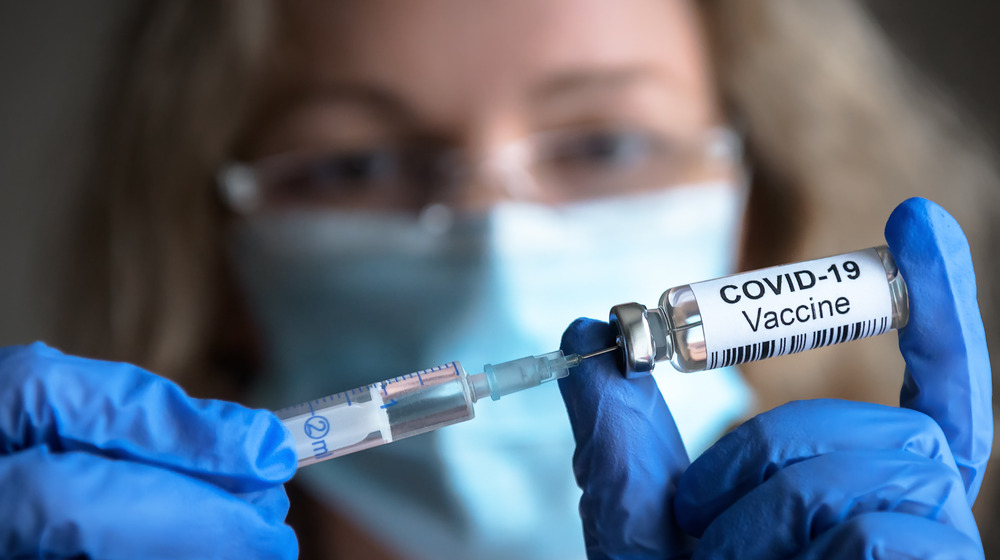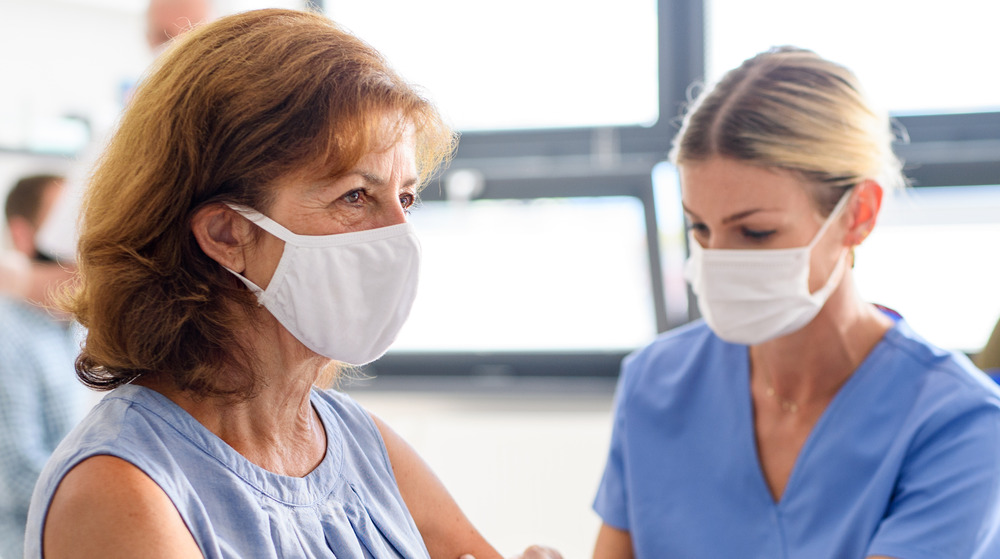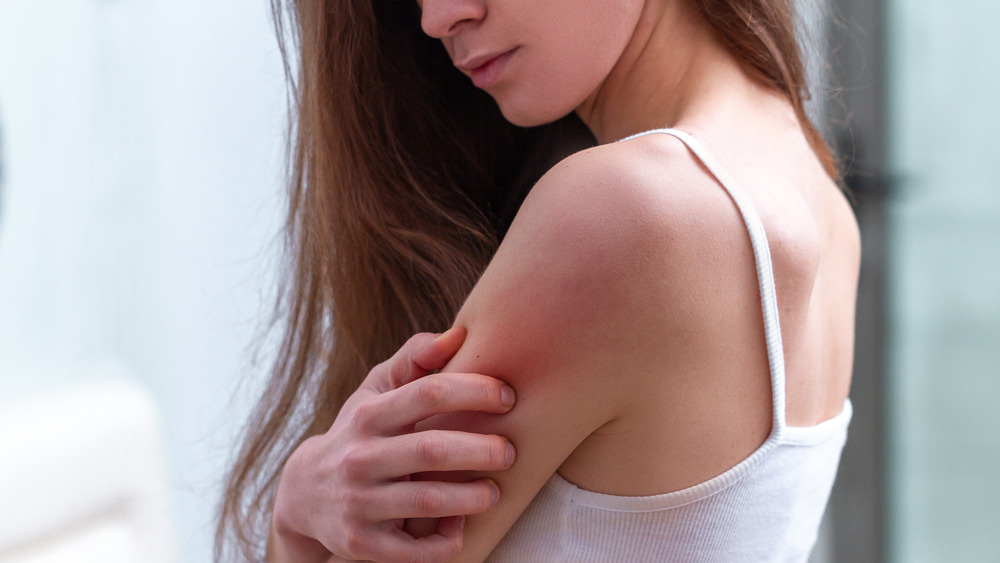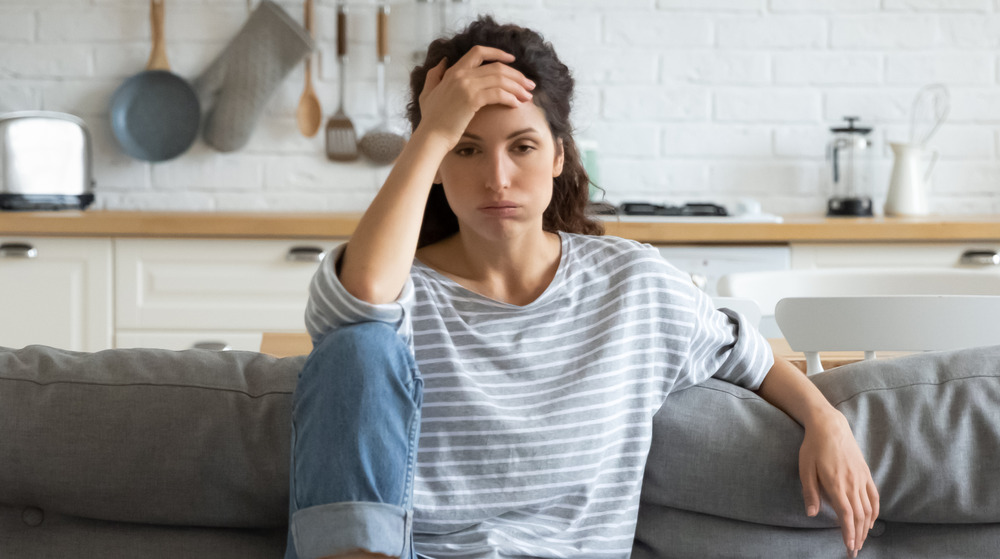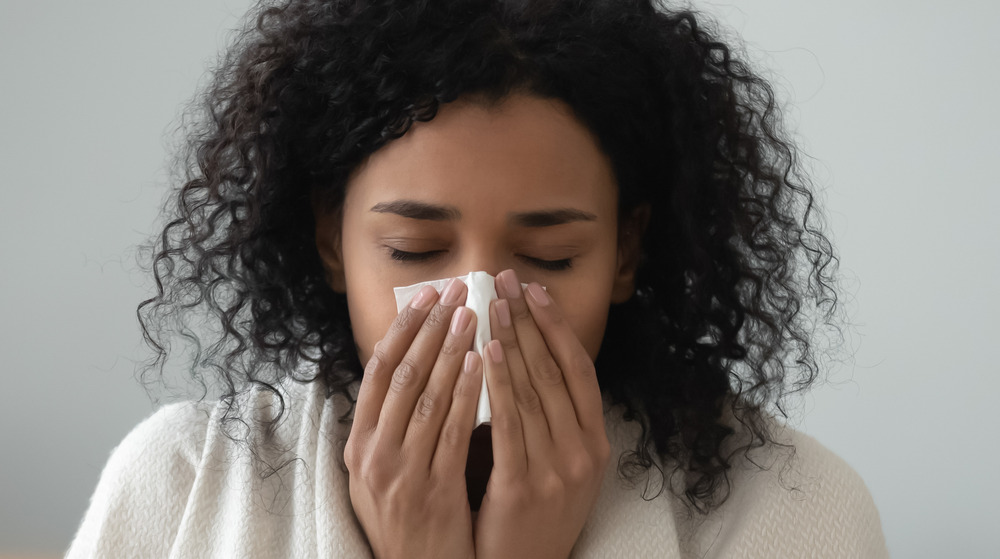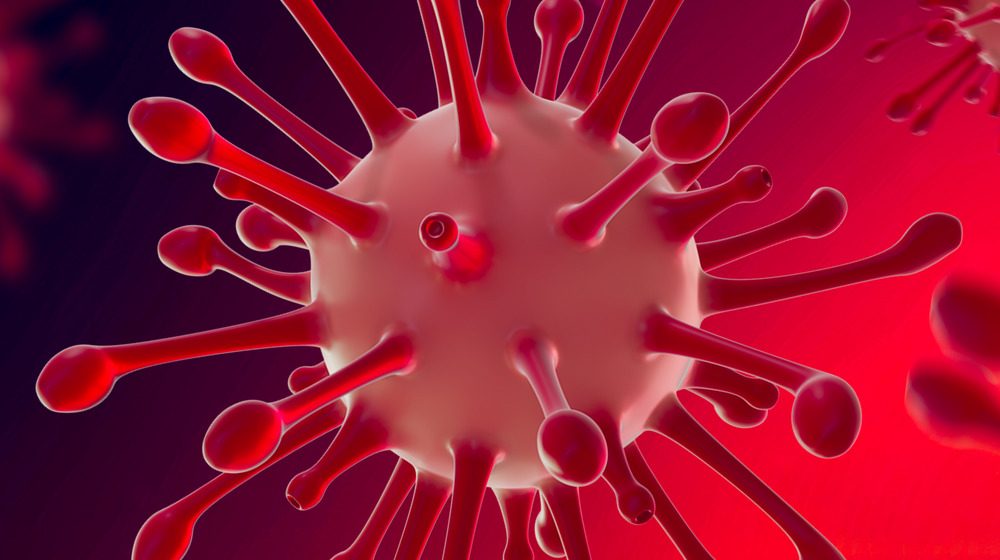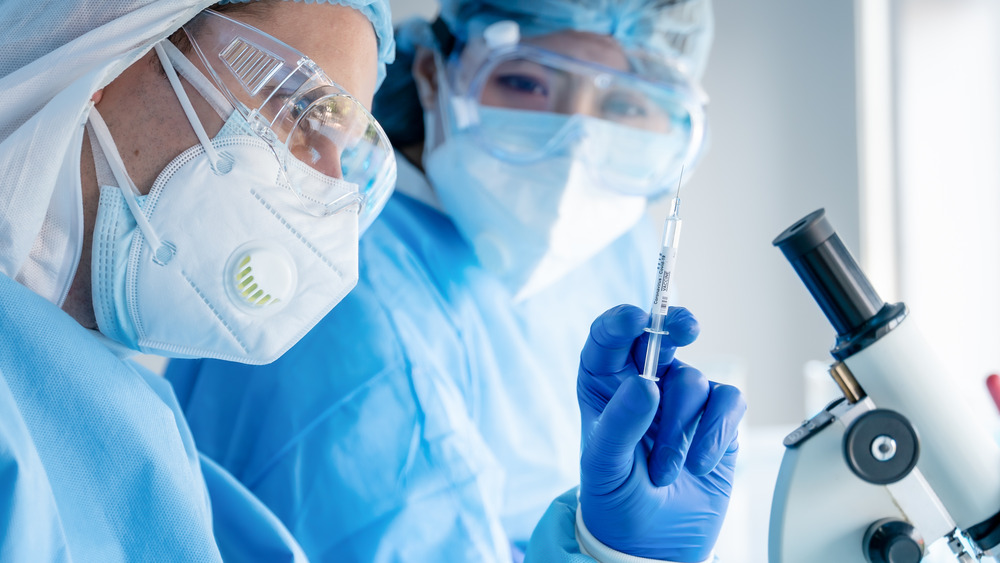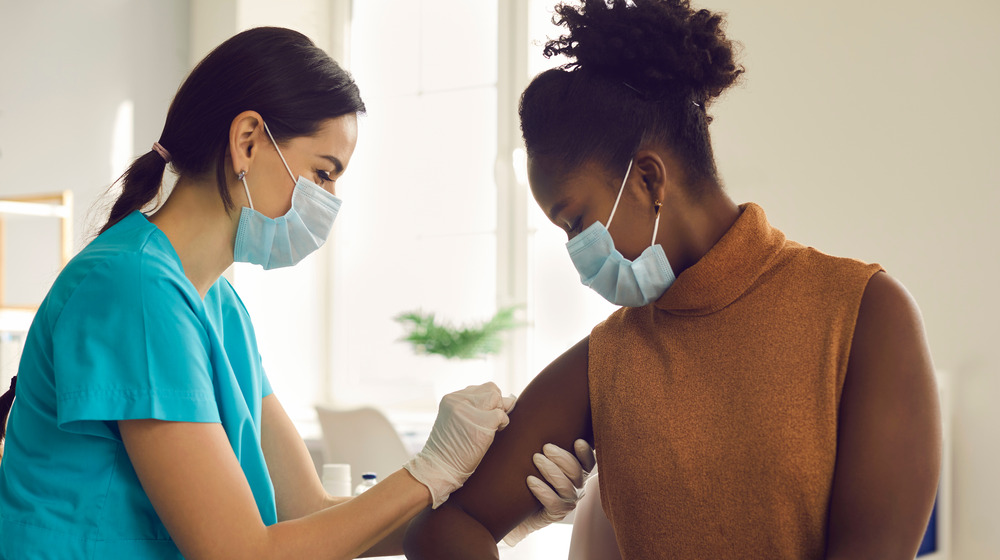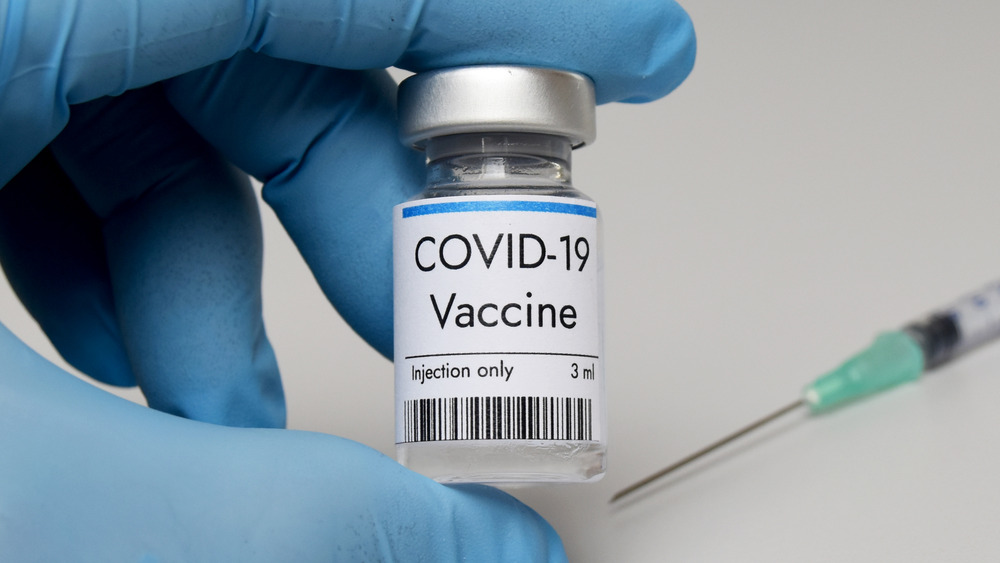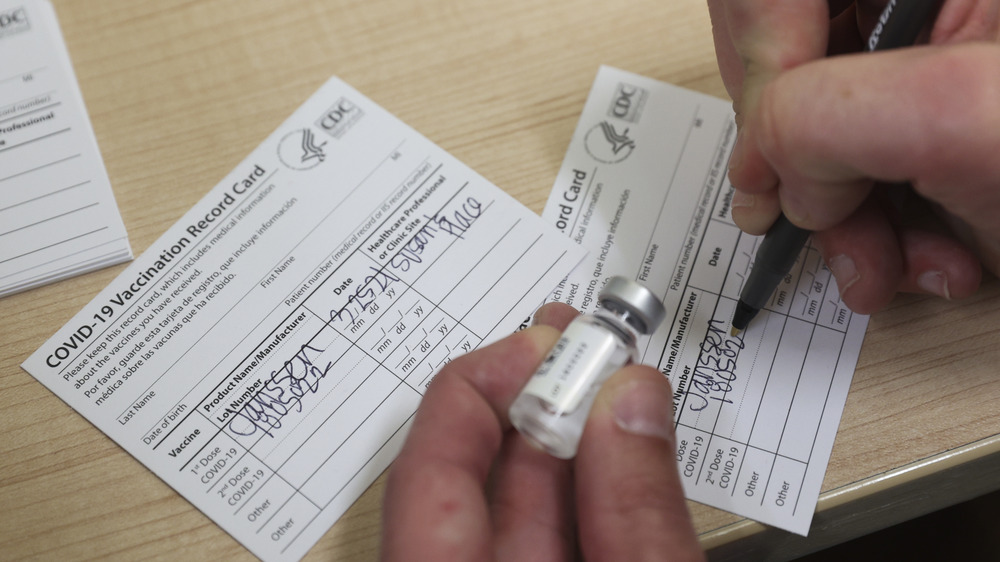What Happens To Your Body When You Take Johnson & Johnson's Janssen COVID-19 Vaccine
COVID-19 is no joke. Most of us have friends or family members who've been hit with the disease, and we've all seen footage of the huge crowds lined up to get vaccines — and wondered when our turn would come.
So when Johnson & Johnson introduced its COVID-19 vaccine in February of 2021, it was cause for celebration. The third vaccine to be made available in the U.S. (following on the heels of vaccines made by Pfizer and Moderna), the Johnson & Johnson shot not only makes more vaccines available to more people, it also offers some huge advantages. It's the first single-shot COVID-19 vaccine, making it more convenient for both medical teams and patients. And according to the American Medical Association, it's safe and it works, although a bit differently than the other vaccines available.
Additionally, unlike other COVID-19 vaccines, the Johnson & Johnson immunization doesn't need to be kept in deep freeze for short-term storage, according to Johnson & Johnson – it can be kept safely at normal refrigerator temperatures for up to three months. This not only makes it practical for small medical offices without deep freezers, but also for mobile medical teams trying to vaccinate people.
You only get poked once with the Johnson & Johnson COVID-19 vaccine
Hate needles? Hate making appointments? Good news: the Johnson & Johnson vaccine is the first single-shot COVID-19 vaccine, meaning you only need one shot to get full protection. This means that unlike your friends still waiting for their second doses of the Moderna or Pfizer vaccines, you're good to go after just one trip to the clinic.
This isn't just a good deal for normal, healthy people wanting to get on with their lives. According to the American Medical Association, infectious disease specialists love the one-shot regime because it makes it easier to vaccinate and protect those who can't plan and schedule medical appointments, such as shut-ins, incarcerated people, and those with insanely unpredictable work or travel schedules.
So after your single dose of the Johnson & Johnson vaccine, you might be tempted to burn your mask and hit the bars — but hold off. Like the other vaccines, the Johnson & Johnson shot works by training your immune system to recognize and fight off the COVID-19 virus, and this training takes about two weeks to fully kick in. Until then, be patient and continue to mask and practice social distancing.
You may get a sore arm after taking the Johnson & Johnson COVID-19 vaccine
No one likes the feeling of a needle jabbing their arm. But some people getting the Johnson & Johnson COVID-19 vaccine may feel more like they've been punched in the arm — hard.
And no, this isn't just from the needle prick; it's a common side effect of all COVID-19 vaccines, and is actually the first sign your immune system has noticed the vaccine and is starting to react to it. "The cells in your arm start up the immune response there, and there's an inflammatory component to it," infectious disease specialist Dr. David Priest told WCNC. "So you'll see a local reaction to it, it's kind of warm and red."
Fortunately, this pain should last only a few days, according to Healthline. Until then, the Centers for Disease Control recommends moving your arm, applying a cold compress if it makes you feel better, or using over-the-counter pain relievers if needed and approved by your doctor. And while you're resting your arm, look on the bright side: with the Johnson & Johnson single-shot vaccine, you only have to suffer from a sore arm once!
You might feel kind of meh after taking the Johnson & Johnson vaccine
If you wake up the day after your Johnson & Johnson COVID-19 shot feeling achy and feverish, don't panic! According to the Centers for Disease Control, these are expected side effects and a sign that your immune system is hard at work building up its resistance against the COVID-19 virus. You may also experience fatigue, nausea, chills, or headaches. Typically, vaccine side effects are more severe for younger people than older ones, according to Dr. Sandra Fryhofer, a trustee of the American Medical Association. They can also be more severe for people who've previously had COVID-19, according to the Cleveland Clinic.
This won't be fun, but these effects normally pass after a day or so, and with your doctor's permission, you can take over-the-counter pain relievers to ease your symptoms. Alternately, you may experience no side effects whatsoever. But since there's no way you can know in advance how your body will react, Dr. Fryhofer recommends taking it easy and ensuring "you don't have a lot of important stuff going on" for a day or two after your vaccination "because you might not feel so well."
Here's what you should know about Johnson & Johnson's COVID-19 vaccine if you have allergies
If you have allergies, you might want to do your homework before rolling up your sleeve for the Johnson & Johnson COVID-19 vaccine.
First, some good news: Are you violently allergic to latex, nuts, pets, or other substances unrelated to vaccines or injectable medications? No worries — the Johnson & Johnson vaccine is still safe for you, and the Centers for Disease Control recommend you get vaccinated once the opportunity arises. Ditto if allergic reactions run in your family or if you've had allergic reactions to oral medications. Nevertheless, Johnson & Johnson recommends that you discuss any allergies with your healthcare provider before being vaccinated.
However, if you've had even a mild reaction to any other vaccination or injectable medication, the CDC recommends that you discuss this with your doctor. Depending on your situation, you may decide to give the vaccine a miss. Finally, if you're allergic to any ingredient in the Johnson & Johnson vaccine (such as polysorbate), you should (obviously) give it a hard pass and ask your doctor if one of the other COVID-19 vaccines would be safe for you.
Here's how the Johnson & Johnson COVID-19 vaccine builds immunity
You probably learned in school that most vaccines contain weakened or dead forms of whatever bug they're fighting. Additionally, once you're vaccinated, your immune system develops antibodies to fight the harmless invaders, protecting you from future invasions by live germs.
The Johnson & Johnson COVID-19 vaccine, however, doesn't contain the COVID-19 virus at all — instead, it contains a different, harmless virus engineered to carry just a single COVID-19 gene. This vaccine trains your body to fight off the COVID-19 virus in a crazy-sounding way: by triggering your cells to make harmless copies of a protein unique to the COVID-19 virus. As the Centers for Disease Control explains, our immune system detects these new creations (which it takes to be actual COVID-19 viruses) and starts producing antibodies to fight them. It also triggers other immune cells to join their battle, resulting in immunity to COVID-19.
This design — which has been used successfully for the Ebola vaccine, among others — means the Johnson & Johnson vaccine presents no risk of introducing infection, either by COVID-19 or the virus used as the vaccine base, according to the CDC.
Here's how effective the Johnson & Johnson COVID-19 vaccine is
Looking at statistics from the Centers for Disease Control, the Johnson & Johnson COVID-19 vaccine looks weak compared to the competition: Moderna's vaccine was deemed 94.1 percent effective at preventing infection after both doses, and Pfizer's vaccine was deemed 95 percent effective. Comparatively, the Johnson & Johnson shot had an effectiveness rate of 66.3 percent. But, as the saying goes, there are lies, damned lies, and statistics. "Don't get caught up in the numbers game, because it's a safe and effective vaccine," warned Dr. Mira Irons, chief health and science officer of the American Medical Association.
A big reason for the discrepancy is that while the Pfizer and Moderna vaccines underwent testing earlier in the outbreak, the Johnson & Johnson immunization underwent testing later on. "When the vaccine was tested, it was at the height of the pandemic," Dr. Sandra Fryhof added. "The variants of concern were out there, so the test for the [Johnson & Johnson] vaccine was harder — you can't compare them." Bottom line? The Johnson & Johnson shot will protect you just fine — so don't turn it down.
If you do get infected after taking the Johnson & Johnson COVID-19 vaccine, it will be mild
Unfortunately, no COVID-19 vaccine provides 100 percent guaranteed protection against infection. But the good news is that if you do contact COVID-19 after receiving the Johnson & Johnson vaccine, you won't get that sick. While the Johnson & Johnson vaccine has gotten a bad rap for its seemingly low overall effectiveness rate, according to Dr. Mira Irons of the American Medical Association, it offers "100 percent efficacy against hospitalization and death from the virus."
This makes the Johnson & Johnson vaccine a critical tool for mitigating the damages of COVID-19 and preventing overcrowding in hospitals, a major priority for physicians and public health officials. "It's really important to focus on the severe end of the spectrum, preventing hospitalization and death," Dr. Irons added.
The takeaway here is that the Johnson & Johnson vaccine excels at its most important job: saving lives. "No hospitalizations occurred in the vaccine group 28 days or more after vaccination as compared to 16 in the placebo group," Dr. Sandra Fryhofer, a trustee of the AMA, explained. "There were also no COVID-associated deaths among those who were vaccinated. That's pretty powerful."
Here's who shouldn't take the Johnson & Johnson COVID-19 vaccine
The Johnson & Johnson COVID-19 vaccine has been proven safe and effective for most adults, according to the Centers for Disease Control, but it's not for everybody; if you have certain medical conditions, you should steer clear or at least talk to your doctor about your options.
First, if you have an allergy to any of the ingredients in the vaccine, you should obviously seek other options. According to the University of Maryland Medical System, you may also be at risk of a severe reaction to the Johnson & Johnson vaccine if you've ever had an allergic reaction to any other injections. To that end, consult your physician for advice concerning the COVID-19 immunization.
Because the safety and efficacy of the Johnson & Johnson vaccine has not yet been tested on people under 18, kids should not take it yet, either. (This may change, since studies are now underway to determine the vaccine's safety for children.) For similar reasons, pregnant or breastfeeding people, as well as anyone considering pregnancy, should discuss taking the vaccine with their doctors before rolling up their sleeves.
Severe allergic reactions can occur after taking the Johnson & Johnson COVID-19 vaccine
According to the Centers for Disease Control, most people receiving the Johnson & Johnson COVID-19 vaccine will experience only mild side effects: soreness at the injection site, and maybe some fatigue or muscle pain for a couple of days after the shot. But in rare cases, patients can have severe allergic reactions to the vaccine soon after receiving it. This is why most vaccination clinics ask you to stay at the site for at least 15 minutes after receiving your shot, according to the CDC. And if you have a history of severe allergic reactions, you may be asked to stay for 30 minutes of monitoring.
Here are some red flags to watch out for in the hours following your vaccination, according to the University of Maryland Medical System: difficulty breathing, a racing heartbeat, swelling in your face or throat, dizziness, or a severe rash covering your body. If you experience any of these, don't wait– get medical help stat.
